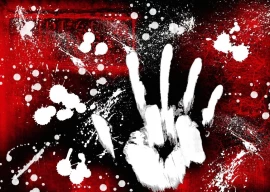
Over the course of an Academy Award-winning documentary, McNamara visibly struggled to come to terms with the past, and all the pain he had caused in a war he had led. Around the end of The Fog of War, McNamara all but broke down, comparing himself to a war criminal for firebombings over Tokyo — another war a younger McNamara killed hundreds of thousands in.

Morris knew his history but wasn’t hostage to it. He was interested only in his subject, and that’s what The Fog of War is: a character study. Unlike most documentarians, Morris cares little for editing in friends and foes — he prefers just a long hard look at the man himself, who stares back at his audience. And it worked wonders: Bob McNamara, the baby genius who wowed the White House, is a man lost in the fog. Closure never came; he died in his sleep a few years after the film’s release.
But if media is a means for telling the truth, it helps when media men take truth so seriously. Morris once lectured, ‘One of the themes that fascinated me was (…) truth or, more specifically, the avoidance of truth and self-deception. My view is that the truth is knowable, but often that we have a vested interest in not knowing, not seeing it, disregarding it, avoiding it.’
With McNamara, who waded into the swamp of Vietnam — and never made it out the same — the truth, and McNamara’s careful twisting of it, all came undone before the camera. In the golden age of documentary, this was non-fictive film the way it was meant to be: rewarding and revelatory. But it was only when Morris interviewed another 80-something ex-warmonger, that the subject burned through the lens.
Donald Rumsfeld, the mad king to end all mad kings, took on Morris — and the results are jarring. Morris shuns the modern-day mumbo jumbo of reality and relativism: he knows there’s something called the truth, and he’ll fight even a demon like Donald to get it. For his part, Rumsfeld doesn’t disappoint: he’s never been worse.
Morris’s subject was chosen with care. When it comes to the story of America’s dark side, Rumsfeld is a recurring character: surviving Vietnam and Watergate, discovering Dick Cheney, raising hysteria over Soviet nukes, then making the case for Iraq — and becoming the Princeton-educated face of murder and mayhem there: ‘Death has a tendency to encourage a depressing view of war,’ he deadpanned once.
A neocon before there were neocons, Don Rumsfeld was the most brilliant — and brutal — of the Bush boys. ‘He’s ruthless,’ said Richard Nixon, Rummy’s foul-mouthed first boss. Because if swaggering stupidity defined George Bush, and Cheney was both bruiser and angler, it was ambition that ran Rumsfeld — the 41st President of the United States, in an alternative hell where Reagan wasn’t threatened by his choice of VP. And Morris’s documentary lays bare how America’s oldest and youngest-ever defence secretary was so good at perverting the idea of America.
Part of it is language. Rumsfeld was always in love with words — weird Orwellian expressions that poisoned the truth; a man that waged war over weapons that didn’t exist by saying ‘the absence of evidence isn’t evidence of absence.’ Fitting then, that the film take its title from Rummy’s most famous philosophy:
‘There are known knowns; there are things that we know that we know. We also know there are known unknowns; that is to say we know there are some things we do not know. But there are also unknown unknowns, the ones we don’t know we don’t know.’ Morris’s documentary is called The Unknown Known, homage to the gobbledygook that came out of these terror wars, and a metaphor for the man himself. Rumsfeld described it as, ‘Things you think you know, that it turns out, you did not.’
Saddam’s nukes, then, were an unknown known — wordplay that justified death and plunder in Iraq. But it was unknown unknowns that Donald feared: becoming a Pearl Harbour leader — a man that would wind up in front of a commission defending disaster. 9/11 did just that, and Rumsfeld retreated into his world of semi-sane Sphinx riddles, ‘We didn’t know we didn’t know that they could do what they did the way they did it.’ Pearl Harbour, like 9/11, was an unknown unknown.
And somewhere between the known and the unknown is Donald Rumsfeld, evading the past by obscuring the present. A man that okays torture in Guantanamo — hooding, stripping, and stress positions — then scrawls on the memo ‘I stand for eight to 10 hours a day; why is standing limited to four hours?’
In over 30 hours of shooting, it becomes evident that, unlike McNamara, Rumsfeld feels no remorse. He stares into the camera unblinking, answering grave moral questions like Abu Ghraib with weasel words. No wonder then, Morris walked away from the shoot as if he’d directed a ‘horror movie.’ This is a man that manufactured the fog: absurd and glib and guiltless, and among the world’s biggest men in different decades.
Slippery Rummy notwithstanding, it’s a slick product — exposing a nightmare not too long ago, scored against distressing Danny Elfman piano keys. And in a land with its own Academy Award-winning documentary — but more recently, cancelled media licences — it’s a strong reminder that no subject is taboo; that evil can be uncovered, because it must be uncovered. But for our knife-fighting media barons, the pursuit of truth may be a hard sell.
Says Rumsfeld of the similarly psychotic Saddam — the man he met before murdering — that Saddam ‘lived in a world of pretend.’ Morris leaves the camera on Rumsfeld 10 seconds too long, once more finding the truth in the lie.
Published in The Express Tribune, June 10th, 2014.
Like Opinion & Editorial on Facebook, follow @ETOpEd on Twitter to receive all updates on all our daily pieces.
COMMENTS (15)
Comments are moderated and generally will be posted if they are on-topic and not abusive.
For more information, please see our Comments FAQ











































Wow, Asad. One of the best-written articles I've read in a long, long time.
@Rabwah wala:
You are be read history?!
@Gurion: Who be Tiger Niazi?
@Rabwah wala: Dear Rabwah, PM Narendra Modi has also been vindicated by many millions of people just recently. I knew when I read that the US did not like him that he was almost certainly OK. Having said that, he is a politician and we know that about 99 per cent of them are unreliable, particularly in the US.
Good piece, well written. And, in a perversion of justice, the heartless Cheney pleaded and received a new heart.
@Sexton Blake:
How about earlier, when they could and did? Lately? They have become punching bags, not peaceful.
After reading this, I'm quite convinced that Pakistan is the greatest nation in our part of the country.
@Gurion: "And the kindness, tolerance and humanity of the Muslim world" Dear Gurion, I thought the article was about Western politicians, but now you are expanding the discussion you are quite right. Unlike the Western world, I am not aware of the Muslims brutally killing several million people lately.
The Author has described the two characters so neatly and explicily and the Lies which sorrounded them that they do not need further quantification. However, for the sake of information, it must be said that the narative about Don and his lies and those of others in the Bush team, were known to the French and German political leadership, and questioned in the München Security conference and as a consequence the two Governments declined to go along with George W adventure in Iraq!!
Rex Minor
@Rabwah wala:
Even better, how about a dissertation about "Tiger" Niazi? Exonerated by Pakistani courts and by Pakistani public. Which pretty much confirms his crimes.
@Sexton Blake:
And the kindness, tolerance and humanity of the "muslim world"
Er..wrong subject...Mostly ..who be Rummy? Who be McNamary? Nobody this side of Middle east gives a doozy about Rummy. Or how McNamary was sloshing through his own tears. Almost drowned. Pick Lord Modi. Exonerated by Supreme court but convicted by the world. Then see the Rickshawalas descend!.
This is the day after we nearly lost our aviation industry. 28 dead and counting. The news of the killings in Taftan are still on the front page. 30 dead and still counting. We have lost over 60000 fighting similar or same as Rumsfeld, the system that he helped put in place after their 9/11, seems to have prevented any major attack on the American homeland. We cannot say the same for ourselves. Why?
If only we could get a few more articles like this, which highlight the remorseless scoundrels running the Western world. Better still, why can't we get these articles when the scoundrels are in power and doing the damage?
dont be so hard on Rumsfeld,statecraft is such a dirty and cruel craft even saints and prophets couldnt keep their hands clean once they got into it.